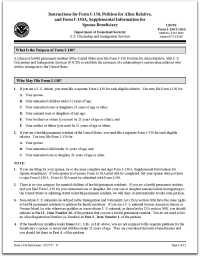I File I130 Again for My Spouse What Shoul I Click on Part 10 in the Form?

Although footstep-by-stride guides through Form I-130, Petition for Conflicting Relative, tin can be helpful, they rarely cover the of import topics. And you can find the official set up of I-130 instructions on the USCIS.gov website. This overview introduces some of the broader — and critically important — bug you won't discover in the I-130 instructions. Everybody's instance is unique – at that place is no elementary set of filing instructions for Form I-130.
The relationship between the petitioner and the beneficiary (intending immigrant) affects the instructions. Every bit exercise many other factors such as adoption, step relationships and previous marriages, and clearing history.
Before you blindly fill out an I-130 petition, go to know these issues and how they tin can bear upon your relative'south immigration case.
Part 1. Relationship
Starting time, y'all must select the type of relative that you lot desire to petition. While U.S. citizens may sponsor any of the options (spouse, parent, brother/sister, or child), lawful permanent residents may only petition a spouse or unmarried child. If this is unfamiliar to y'all, visit our overview on the basic rules of family-based clearing.
If you are filing the I-130 petition for a child or parent, you'll need to select an option for the type of relationship: biological, stepchild/stepparent, or adoptive. Cases with biological relationships are mostly the most straightforward, but the laws that affect step relationships and adoptive relationships get more complicated. For instance, the union that created a stepchild/stepparent human relationship must take place before the child'southward 18th birthday. Petitioners with step or adoptive relationships will likewise have to submit additional documentation as evidence of the human relationship.

There are some additional questions most adoptive relationships. These are generally easy to answer. However, as previously explained, adoptive relationships tin make the visa petition process more complicated and the use of an immigration attorney is mostly recommended.
Role 2. Information Virtually You (Petitioner)
Well-nigh of Role 2 is easy to empathize, just at that place are a few primal concepts that the preparer should exist aware of that are not covered in the USCIS I-130 instructions.
Address History
For U.S. citizens, the country where you lot live is not a major event as information technology relates to the I-130 petition. However, your land of habitation will have a significant affect on your overall case. Later on the I-130 is approved and your relative applies for a green card, the petitioner will have to ready Form I-864, Affidavit of Support. The petitioner (sponsor) must exist domiciled in the United States to file Class I-864, Affidavit of Support. More often than not, in that location are iii possible scenarios:
- If the sponsor lives and works in the Usa, the state of abode is the United states of america. In that location is no issue.
- If the sponsor lives outside the The states due to temporary employment but has maintained a home in the U.S. and intends to render to that dwelling, the land of domicile is the The states.
- If the sponsor lives permanently exterior the Usa, there may be a problem. The sponsor must supply show (with Form I-864) that he or she will reestablish domicile in the United states.
RECOMMENDED: Proof of Domicile on I-864 Affidavit of Support
A lawful permanent resident may have a more than meaning issue if he or she is "living" outside the U.s.a.. Stays in strange countries as little equally 180 days tin can atomic number 82 to greenish card abandonment.
Your Marital Information
If the beneficiary of your petition is a spouse, expect your marital history (if applicable) to become extra attending. For starters, you'll demand to bear witness that any previous marriages (for you or your spouse) take concluded. In other words, you'll need a divorce decree, annulment or death document.
If yous gained your lawful permanent resident status past virtue of a prior marriage to a U.Due south. citizen or lawful permanent resident, you may not file Grade I-130 for a spouse unless:
- A period of 5 years has elapsed since you became a lawful permanent resident; or
- Your prior marriage through which you gained your permanent residence was terminated by death of your quondam spouse.
If you cannot meet one of the above criteria, a 3rd option exists. There is an exception if you can establish by clear and convincing evidence that the prior matrimony through which yous gained your permanent residence was not entered into for the purpose of evading any provision of the immigration laws. This can exist difficult and may require the assistance of a legal expert.
Part 3. Biographic Information
Equally yous may have noticed, Hispanic/Latino is provided as a choice for ethnicity, but it is non provided as a choice for race. This is because USCIS (and the U.S. government) do non define Hispanic/Latino every bit a race.
For race, you must choose one or more of the values provided in the list. There is no wrong answer. You may answer the question with the race(south) you most closely identify.
Applicants from Cuba, Mexico, Puerto Rico, South or Cardinal America, or any other Spanish culture or origin should choose the race(due south) that fits all-time for your situation. Many Hispanic petitioners select "white" just others cull "black" or "American Indian." (Y'all may choose more than one.) At that place is no ane single answer that works for all Hispanic people. The reply is individual to you.
Part 4. Information Well-nigh Casher (the intending relative)
Once more, nearly of the information that'due south required per the Form I-130 instructions is straightforward. But the I-130 instructions don't necessarily reveal the reasons some of this data is necessary.
Beneficiary's Marital Information
Equally previously mentioned, visa petitions for spouses will get some actress scrutiny. This is specially truthful if there's a history of marriage fraud. If it has ever been legally determined that your spouse attempted or conspired to enter into a marriage for the purpose of evading U.S. immigration laws, your petition volition receive extreme scrutiny. If this situation applies to you and your spouse, contact an immigration attorney before filing Form I-130.
Information Almost Beneficiary's Family
You take the opportunity to listing the casher'south spouse and children. "Children" includes only single children under age 21 (if applicative). Include all children fifty-fifty if they volition non exist immigrating to the Us.
If the spouse and children likewise intend to immigrate to the U.s.a., it may or may not be necessary to file separate I-130 petitions. This can be confusing for many petitioners. You are not required to file carve up petitions for the beneficiary's spouse or unmarried children (under 21) if the beneficiary is your:
- Married son or daughter and you are a U.S. denizen
- Blood brother or sister and you are a U.S. citizen
- Spouse and you are a lawful permanent resident
- Single child (under 21) and you are a lawful permanent resident
- Unmarried son or daughter (21 or older) and you are a U.Due south. citizen or lawful permanent resident
The spouse and children in these cases (as listed above) authorize as "derivative beneficiaries." A separate I-130 is not required. Once the I-130 is approved and current, the derivative beneficiaries may apply for an immigrant visa (light-green card) at the same time as the master beneficiary.
This is not the instance for the spouse and children of firsthand relatives. For example, if you are a U.South. denizen petitioning a spouse, you must file separate I-130 petitions for your spouse's unmarried children under 21 years of historic period. This is one of the almost disregarded details in the I-130 instructions.
Beneficiary's Entry Data
If your relative has e'er been in the U.s.a., this is an extremely important department. By and large anyone with a flow of unauthorized stay (through unlawful entry or visa overstay) should seek the advice of an immigration attorney.
When a strange national remains in the U.s.a. longer than the period of authorized stay, it's called "overstaying" a visa.

Your relative'south visa may be valid for several years. However, the visa does not govern the length of his or her authorized stay in the U.S. — it merely allows your relative to enter the United States during that time period. Instead, your relative's Form I-94 governs your relative's authorized stay in the United States. The date on your relative's Form I-94 is the terminal day he or she is permitted to remain in the U.S., and information technology may not be valid for every bit long as the visa is valid. Your relative must depart the U.S. by the date on the Course I-94, or he/she will have overstayed the visa.
Overstaying a visa can have significant, long-term consequences. If your relative overstays a visa for 180 days or more than (but less than one year), when he/she departs the U.Southward. he/she volition exist barred from reentering the U.S. for three years. If your relative overstays a visa for ane twelvemonth or more, when he/she departs the U.South. he/she will exist barred from reentering the U.S. for 10 years. Confined to reentry will severely damage your relative's attempts to obtain a greenish menu.
Generally, an immediate relative may adjust status (file I-130 and I-485 meantime) if the overstay is less than 180 days. Whatsoever family preference type relationship should leave the U.Southward. as shortly as possible and/or contact an experienced immigration lawyer. The immigrant is deportable during any period afterward the final solar day of authorized stay and before he/she becomes an aligning of status applicant.
Unlawful Entry
If your relative is planning to adjust status to permanent resident, the immigration status (class of access) is very relevant. For starters, your relative must have a lawful entry to adjust condition. The I-130 instructions do not encompass this topic. That's because the lawful entry is a requirement for Form I-485. But you are documenting your relative'southward immigration history. If there are discrepancies or past violations, they're on record.
Lawful entry means that your relative was admitted or paroled into the United States. In most cases, this ways that the company entered the United States with valid documentation and made face up to face up contact with a U.S. clearing officer and that officer acknowledged entry to the U.s.. Typically, this happens at a port of entry (airports, seaports, etc.) when the visitor shares his or her passport and visa. However, at some border entries, visitors may be "waved" across while in their cars. This besides counts as a lawful entry as long as the visitor had the proper documentation (e.g. Visa Waiver Programme). If the visitor entered with a valid visa, merely that visa has since expired, the visitor all the same had a lawful entry.
Part 5. Other Data
The petition asks if yous e'er previously filed a petition for this beneficiary or whatever other alien (relative). If you have submitted previous petitions, consider what happened and review the previous petitions you lot've submitted. You need to be certain that your facts are consequent. This is especially true if you've filed Form I-130, and USCIS denied the petition. Understand the reasons for the deprival, how it may impact your current petition, and consult with an immigration attorney if necessary.
How CitizenPath Made I-130 Instructions Easier

CitizenPath.com can help you prepare Class I-130, Petition for Conflicting Relative, to navigate through these issues. Clearing attorneys designed the low-cost service to include simple I-130 instructions. CitizenPath will provide an instant warning if your answer to a question could exist problematic. Nosotros'll too make certain that your petition is consummate. In fact, we guarantee that USCIS will accept your I-130 petition.
What'southward more than, the service includes a set of simple I-130 instructions for filing the petition. CitizenPath customizes the filing instructions based on the petitioner's unique situation. So you lot will know exactly which documents to submit with the petition and where to mail it.
CitizenPath's self-directed software is even free to attempt. If you're not eligible or if we observe a problem, you lot can stop at any time. No payment is required until you attain the end of the petition. Effort information technology now.
Note to Reader: This mail service was originally published on May 23, 2017, and has been modified with improvements.
Source: https://citizenpath.com/i-130-instructions-immigrant-petition/
0 Response to "I File I130 Again for My Spouse What Shoul I Click on Part 10 in the Form?"
Post a Comment